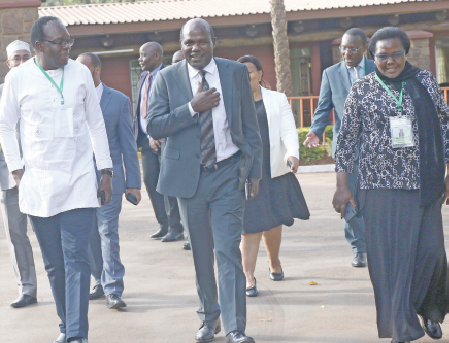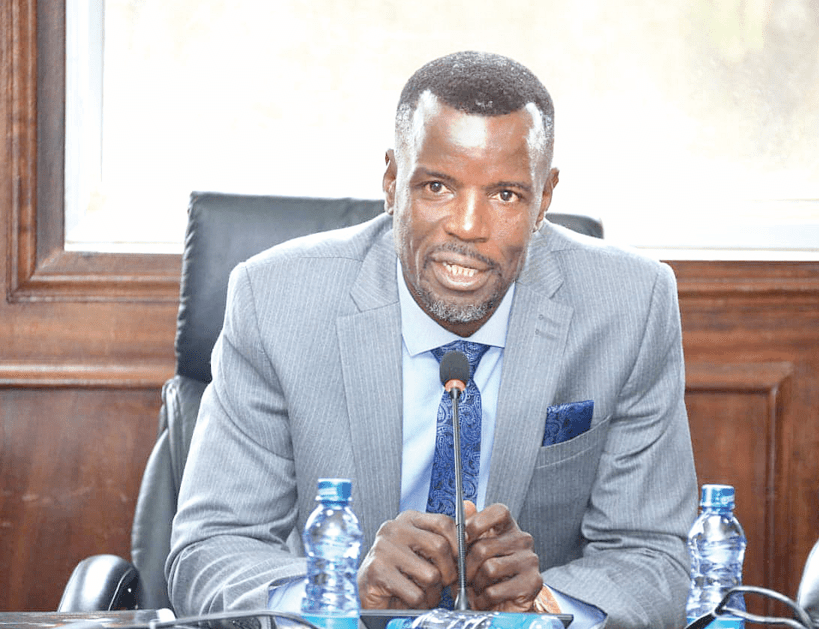IEBC faces tough questions as poll clock ticks away

Questions are being raised about the capacity of the Independent Electoral and Boundaries Commission’s (IEBC) to conduct the August 9 elections after the agency postponed the certification and gazettement of the voters’ register.
On Monday, commission Chairman Wafula Chebukati also said that the register would also submit the register to both the National Assembly and the Senate.
The National Assembly went on an indefinite break last week, while the Senate followed suit yesterday before the commission even finished implementing the recommendations given by KPMG, the audit firm tasked with ensuring the credibility of the registers.
And with only 47 days to the elections, the electoral agency still finds itself grappling with a number of challenges, ranging from irregular transfer of registered voters in at least ten counties, and uncertainty over the ability of its gadgets to transmit results.
“The aduit identified the specific counties which had abnormal trends and voter transfer numbers, Chebukati said even as he promised “quick and corrective action”.
This remains an uphill task given, for instance, that there were 172,929 voters whose ID or passport details did not match the names recorded. Another over 144,674 had either duplicate IDs or passports or no details at all about their identity. Yet another 145,000 had invalid document references.
One other challenge arose during a test run involving about 1,200 polling stations. The test run, conducted at Bomas of Kenya earlier in the month, had a success rate of less than 60 per cent, raising hard questions about network connectivity and reliability of results in the selected polling stations.
Double voting
Questions also abound over whether data migration to the election kits was conducted successfullly and whether the use of biometric voting system only would perfectly work or not on election day given uncertainty over reliability of a purely technology-driven process.
A day after IEBC released the final voters’ register, which indicated that a total of 22.1 million Kenyans qualify to participate in the August 9 General Election, it finds itself with more questions than answers both from political parties and their representatives, as well as from analysts and voters.
It still remains unclear whether the mechanisms put in place by the electoral agency will give contestants assurances that they are sufficient to prevent rogue voters from casting ballots twice and whether it has an inbuilt system to ensure “dead voters” do not take part in the poll.
“IEBC remains quite opaque on the mechanisms put in place to ensure that the biometric system will not break down,” Mulle Musau, an electoral expert with the Elections Observation Group told People Daily. “What will happen in areas where there is no power? It is foolhardy for the agency to have adopted a 100 per cent biometric system without the complimentary physical register.”
IEBC officials had on Monday said the print-out of the voters’ register had in past elections been used to facilitate irregularities. A digital system, CEO Marjana Hussein Marjan said, would ensure that a returning officer could not tamper with voting because one would need a voter’s biometric details or their names and ID numbers to access the system.
However, Musau said that the BVR system relies heavily on a steady supply of electricity for the laptops, yet IEBC has previously failed to provide backup power beyond the life of the one battery the computers start out on. Although IEBC has also said that it would provide an extra kit for every polling station, it still remains unclear whether such a provision was sufficient back-up given the high voter turn-out registered in the past when it was routine for over 80 per cent of voters to show up at polling stations.
Electoral violence
In the event that systems fail in some parts of the country, this could set the ground for affected candidates to rush to court to challenge the results, raising fears of an annulment in the event that Supreme Court judges find that elections were not conducted in a manner that was verifiable and transparent. This was the ground judges used to nulify the first presidential election of 2017.
A dispute over poll results comes with the extra risk of sparking protests, which have potential to turn violent, a prospect that Kenyans are waring about because the economy is yet to recover from the effects of Covid-19 – which has ravaged Kenya’s economy for over two years.
This slowdown was compounded by the ongoing war in Ukraine, which has raised the cost of living in Kenya by leading to an increase in the cost of exports like wheat, fuel, palm oil and fertiliser.
Whereas Interior Cabinet Secretary Fred Matiang’i has in the past said that the security agencies are ready to prevent or stop any form of electoral violence, IEBC will not to play its cards well to forestall such an eventuality and address fears of unrest over delayed or disputed results.
One way to do this is to ensure that it has reliable connection to power supply – or a back-up system – in all its 46,232 polling stations. Where this is not possible, it will need satelite gadgets to transmit results or inform the public in advance to anticipate delays. It will also need to clarify what mode of transmission of results will be used from polling stations that neither have 3G nor 4G network.
While acknowledging the budgetary challenges facing the commission, Chebukati said poll officials in areas without network will be provided with modems subject to the availability of funds.
Wananchi are also expected IEBC to make public the results of the KPGM aduit. Yesterday, People Daily established that the report was handed over to the seven commissioners and the Commission Secretary Marjan but other staff members still in the dark over its contents.
“Previously the commission had announced that it would certify and publish the register of voters on or before June 9, 2022. However, due to the implementation of these preliminary audit findings on the register (by KPMG), the commission has decided to address the finding prior to certifying the register for publication on or before June 20, 2022,” said Chebukati last week.
Although he crossed that first hurdle on Monday, he is yet to announce when the register will be certified and gazetted.
Final register
While releasing the preliminary findings, KPMG’s Head of Advisory Gerald Kasimu said they had made a range of recommendations, some to be implemented immediately and others requiring time and investigations.
“We have discussed with the commission the number of records that needs to be reviewed for purposes of rectifying any other anomalies and we expect that by the time we issue our final report. We can confirm to the commission that we are comfortable with the implementation of the recommendations that we have made,” said Kasimu. “There are still quite a number of recommendations that must be dealt with before the final register can be gazetted and submitted”.
Raila Odinga – the Azimio-One Kenya Coalition flagbearer – and his UDA counterpart, William Ruto, have in the past questioned IEBC’s preparedness to conduct free and fair polls. Raila, for instance, questioned if the commission had developed a constitutionally compliant protocol for results transmission. His election team also wanted to know when IEBC would share the protocols with political parties.
In his 10-point questions to the electoral agency, Raila questioned the status of the voters’ register and when the final report of the audit of the register was expected. That work is still ongoing.
He also asked the commission if it had put in place measures to ensure there were no lapses in both logistics and security in the general election and the status of the data migration from the Morpho Idemia system to magmatic.
On Monday, Chebukati said: “The commission has already commenced implementation of KPMG recommendations with the third parties providign the commission with IT support. This includes application of “Least Privilege Principle” by disabling all user access rights and only giving them privileges needed to complete their specific tasks.”
Manual register
That might include denying returning officers access to the full register to prevent tampering, as Marjan said. This too comes with its own risks and rewards as some parties have insisted that IEBC print the register for voter verification.
“We believe that using the digital register will cut down on the practices where the presiding officers have knowledge of who has voted and who hasn’t. It is not possible to commit the malpractices with the digital register. The information on who has not voted will not be available,” said Chebukati.
However, the Azimio la Umoja legal representative Ben Shihanya, said that elections regulations provides that a manual register be used as an alternative to the electronic one.
“The commission should tell us what law they have used to do away with the manual for the digital register,” said Sihanya
Yesterday, Azimio’s legal advisor Paul Mwangi told People Daily that they requested the commission to give them the KPMG report so that they can interrogate the recommendations.
“They said they will first take it to Parliament. Of course, when they go that direction they are right but they should make it public. We need to know what the report unearthed,” said Mwangi.












